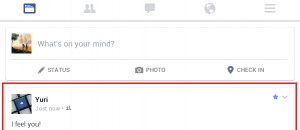It has recently been revealed that Facebook collects data on posts you decide to not send out. Now while the company apparently doesn’t have a database of the actual text of messages you don’t post, it does take note of things like the time and where you were going to post it. Awesome.
Facebook refers to these non-comments — comments you type but don’t actually post — as self-censorship, and they don’t like it. Any time you decide not to post on something, they are losing data that could potentially be useful to them for advertising.
“Facebook considers your thoughtful discretion about what to post as bad, because it withholds value from Facebook and from other users,” Jennifer Golbeck writes in an article for Slate. “Facebook monitors those unposted thoughts to better understand them, in order to build a system that minimizes this deliberate behavior.”
Sauvik Da, who is undergoing a Ph.D at Carnegie Mellon, and Adam Kramer, a data scientist for Facebook, have written an article that examines self-censorship, and one of the reasons they give as to why it is a bad thing is that some of your friends may miss out if you decide not to post something. “Consider, for example, the college student who wants to promote a social event for a special interest group, but does not for fear of spamming his other friends — some of who may, in fact, appreciate his efforts,” they write in the article.
That really does feel like nitpicking, and the idea that it is wrong to self-censor yourself feels wrong to me. We’ve all been on the verge of writing an angry email or post on things like Facebook, taken a step back, thought about it, and not posted it when acting under a cooler head. The idea that we have to share everything is kind of ridiculous and it seems clear that the only reason Facebook really cares about it is because by doing so, they lose out on money. Or maybe they have nobler intentions at heart. Who knows.

 Email article
Email article




